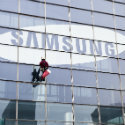Takeover of contactless specialist by South Korea's tech giant issues a challenge to mobile wallet rivals.

Samsung has stepped up its game in mobile payments with a takeover of contactless technology developer LoopPay.
The deal could make the South Korean electronics giant a serious threat to Apple Inc. (Nasdaq: AAPL) and other technology players fighting for control of the mobile payments business.
Samsung Electronics Co. Ltd. (Korea: SEC) is widely expected to introduce a mobile wallet service with the Galaxy S6 smartphone it will unveil at the Mobile World Congress in early March, and LoopPay looks set to feature prominently in the company's future plans.
"Through this deal we can significantly accelerate our mobile commerce efforts," said David Eun, the executive vice president of Samsung's Global Innovation Center, in a company statement. Eun also noted that LoopPay "is not just safe and reliable, but also widely accepted at more locations than any competing service."
Based in Boston, Mass., LoopPay has developed a technology it claims will turn existing magnetic stripe readers into mobile contactless receivers without the need for major investments in new infrastructure.
According to LoopPay's own research, the technology has the potential to work in about 90% of the point-of-sale (PoS) terminals that are already in commercial use.
That could give Samsung a significant edge: Retailers need to have installed near-field communications technology in their PoS terminals to support most other mobile wallet services, including Apple Pay and Google Wallet.
For all the latest news from the wireless networking and services sector, check out our dedicated mobile content channel here on Light Reading.
Even so, the mobile payments industry is becoming increasingly congested. When iPhone maker Apple launched its Apple Pay service in late 2014, it joined an array of companies from all parts of the value chain already active in the market. (See Apple's New iPads: Built for the Enterprise.)
Mobile operators AT&T Inc. (NYSE: T), Verizon Wireless and T-Mobile US Inc. have teamed up on a mobile wallet joint venture called Softcard (originally Isis), whose progress has been halting. Retailers such CVS, Target Corp. and Walmart have also clubbed together in the Merchant Customer Exchange, which is promoting a payments system branded CurrentC. (See Why Sprint Doesn't Put Money on Isis.)
Samsung's acquisition of LoopPay may be a particular worry for Google (Nasdaq: GOOG). Having failed to gain traction since being launched way back in 2011, the Google Wallet service needs all the help it can get. Samsung remains the biggest seller of smartphones using Google's Android operating system, but it seems likely to start prioritizing its own services over Google Wallet in the wake of the LoopPay deal.
Samsung has not disclosed how much it paid for LoopPay but has previously been one of the company's key investors, along with financial services company Visa and "private label" credit card provider Synchrony Financial.
Following the deal, LoopPay founders Will Graylin and George Wallner are to begin working closely with Samsung's Mobile Division on further developing their technology.
— Iain Morris, 

 , News Editor, Light Reading
, News Editor, Light Reading
About the Author(s)
You May Also Like











